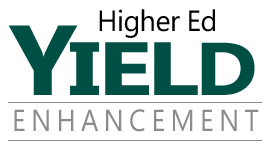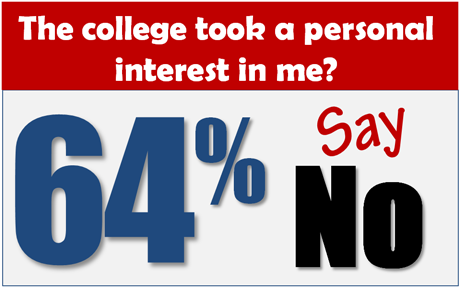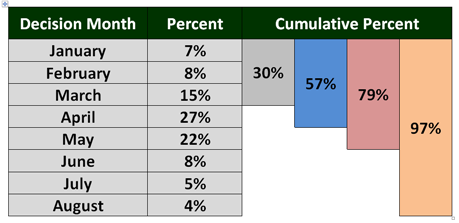It is the end of January and college admissions professionals are in the throes of putting together their 2015 class. Many spent the fall months traveling the country, meeting with prospective students, gathering and imparting information. Now we find ourselves in the crucial “Season of Yield,” where the final decisions will be made, both by the colleges and by the students.
If you are feeling some stress about making your class, you are not alone. According to Inside Higher Ed’s 2014 Survey of College and University Admissions Officers, 47 percent of admissions leaders said they were very concerned about making their class (up from 46 percent last year) and another 32 percent reported that they were moderately concerned (up from 30 percent). Only 5 percent of admissions directors were not concerned at all.
Working with admissions professionals across the country we have identified three very common mistakes that could be impacting your yield. Good news: Avoid these missteps and you will see greater success this year.
Here’s what NOT to do:
1. Make Big Assumptions
Assuming that it is too early for student to make a college commitment, or taking for granted that a particular student you have connected with is definitely coming to your school, are big mistakes.
We recently shared with you a recent study that shows that nearly one-third of students make their final college selection decision before the end of March, and by the end of April that percentage rises to 57%. Even more importantly, the study revealed that many students make an emotional commitment long before they formalize that intention. (Request a copy of the The Excitement Factor!)
2. Fail to Communicate on a Personal Level
Many admissions counselors tell us that it can feel awkward to call a student when they haven’t yet been officially admitted or received financial aid award information. If you don’t continue to have meaningful conversations with a prospective student now, at this critically point in the selection cycle, you are making a grave mistake.
Now is the time to ramp up your communications efforts, not scale them back. If you have created a bond with a student you will have plenty to talk about. And, if you haven’t built that rapport yet, don’t waste another minute getting to know him or her. (See The Counselor Training Series: Probing to Uncover Key Information About Prospective Students.)
3. Not Use Intelligence Intelligently
When you truly get to know a student as an individual, you make them feel valued and important. You also have a wealth of knowledge about that person that can guide you in your recruiting efforts. Now is the time to put that intelligence to use. Connect the prospective student to other students, activities and professors that will ignite their enthusiasm for your college.
It is all about finding the right fit for each and every student. If you have done your groundwork, you will know if the student and the college are right for each other. You will also know how to best demonstrate that to the student.
 Rick Montgomery is as an Enrollment Strategist at Longmire and Company. With over 20 years in higher education marketing, he brings an innovative approach to helping colleges and universities meet their enrollment goals. Rick can be reached at 913/492.1265 x.708 or via email at rmontgomery@longmire-co.com.
Rick Montgomery is as an Enrollment Strategist at Longmire and Company. With over 20 years in higher education marketing, he brings an innovative approach to helping colleges and universities meet their enrollment goals. Rick can be reached at 913/492.1265 x.708 or via email at rmontgomery@longmire-co.com.

 Bob Longmire is President of Longmire and Company, Inc. He is a recognized expert on the topic of how prospective students and parents form their college selection decisions – and how colleges can use that knowledge to grow and control their enrollment. He can be reached at (913) 492-1265, ext 709 or at blongmire@longmire-co.com.
Bob Longmire is President of Longmire and Company, Inc. He is a recognized expert on the topic of how prospective students and parents form their college selection decisions – and how colleges can use that knowledge to grow and control their enrollment. He can be reached at (913) 492-1265, ext 709 or at blongmire@longmire-co.com.

